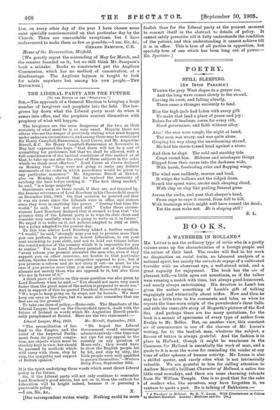F.ro MI EDITOR OP THE "SPECTATOR.") SIR, — The approach of a
General Election is bringing a large number of lawgivers and prophets into the field. The law- givers lay down what the Liberal party must do when it comes into office, and the prophets content themselves with prophecy of what will happen.
The lawgivers are the more dangerous of the two, as their certainty of what must be is so very exact. Happily there are
others who see the danger of positively stating what must happen under unknown circumstances, and among these may be mentioned Sir Henry Campbell-Bannerman, Lord Crewe, and Mr. Augustine
Birrell, K.C. Sir Henry Campbell-Bannerman at Newcastle in May last expressed the hope "that there will not be a sort of scrambling for preference, but that we shall be allowed, with a
full consideration of the tactical conditions of this method or of that, to take up one after the other of these subjects in the order which we think most effective." Lord Crewe at Crewe declared
on Monday that " they were not going to make any definite statements of the order in which precedence would be given to any particular measures." Mr. Augustine Birrell at Bristol, also on Monday, showed that he realised the necessity of catching the hare before cooking it. "The first thing needed," he said, "is a large majority."
Statements such as these recall, if they are not inspired by, the famous utterances of Lord Rosebery in his Chesterfield speech on December 16th, 1901. On that occasion he pointed out that it was six years since the Liberals were in office, and sixteen since they were in anything like power. " During that time the world," he said, " has not stood still." Under these circum- stances Lord Rosebery declared that it seemed to him that "the primary duty of the Liberal party is to wipe its slate clean and consider very carefully what it is going to write on it in future." He urged it to write on it, not policies adapted to 1892 or 1885, but a policy adapted to the present day.
To this wise advice Lord Rosebery added a further caution. "I would," he said," strongly urge you not to promise more than
you can perform, to profess an honest Liberalism, to cut your coat according to your cloth, and not to hold out visions before the constituencies of the country which it is impossible for you to realise." For, as Lord Rosebery pointed out at Chesterfield, " every reform you promise alienates the men who, even if they support you on other occasions, are hostile to that particular
reform, besides those who are altogether opposed to you; but if you promise a reform and do not carry it out—as must be the case if you promise more than you can perform—why then you alienate not merely those who are opposed to it, but also those who are in favour of it."
A third piece of advice on this same question was also given by Lord Rosebery when he said :—" You should not move very much faster than the great mass of the nation is prepared to move too." And in support of this he quoted President Roosevelt's saying:— "We hope to keep going on by steps, not by bounds. We must keep our eyes on the stars, but we must also remember that our feet are on the ground."
To take one item of policy,—Hothe-rule. The Manifesto of the Liberal League, based on the Chesterfield speech, dealt with the future of Ireland in words which Mr. Augustine Birrell practi- cally paraphrased at Bristol. Here are the two statements :—
Liberal League, May, 1902. Mr. Birrell, September, 1905.
" The reconciliation of Ire- land to the Empire, and the relief of the Imperial Parlia- ment from its present conges- tion, are objects which must be steadily kept in view, but should be pursued by methods which will carry with them, step by step, the sympathy and support of British opinion."
" He hoped the Liberal Government would encourage administratively—the time was not ripe for any appeal to the country on any question of Home-rule; they would have to show the English people bit by bit, and step by step, the Irish people were well qualified to govern themselves."-- Western Daily Press, September 26th.
Sir, •if the Liberal party will not only continue to remember Lord Rosebery's good advice, but act on it, then the outlook for Liberalism will be bright indeed, because it is pursuing a practicable policy.
—I am, Sir, &c., X. foolish than for the Liberal party at the present moment to commit itself in the abstract to details of policy. It cannot safely prescribe till it fully understands the condition of the patient, and this understanding it cannot achieve till it is in office. This is true of all parties in opposition, but specially true of one which has been long out of power.— ED. Spectator.]










































 Previous page
Previous page